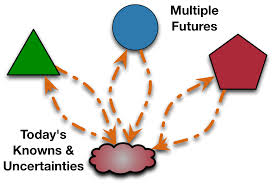 You’ll recognize the familiar way to tell an optimist from a pessimist. Give each a glass of water filled to the halfway point and ask them to describe it. The optimist says the glass is “half full”, the pessimist says it’s “half empty”. From this you can extrapolate their answers to the question: “What happens next?”
You’ll recognize the familiar way to tell an optimist from a pessimist. Give each a glass of water filled to the halfway point and ask them to describe it. The optimist says the glass is “half full”, the pessimist says it’s “half empty”. From this you can extrapolate their answers to the question: “What happens next?”
Trying to determine what’s going to happen is something we have to do in business. Given the same set of circumstances the optimist will conclude that things will improve whereas the pessimist might say things will get worse. Both perspectives assume that a previous trend will continue.
Looking backwards is how we usually begin to create a forecast of what’s going to happen next, telling ourselves that the past is a guide to the future. Unfortunately the future can differ greatly from our imaginings and for businesses the differences can be costly.
A valuable tool for equipping business planners to cope with the potentially expensive unknowns lurking in our futures is called scenario planning. Instead of just projecting the past into the future it uses a scenario-based process to create possible future events that will affect our businesses, thereby giving us a chance to prepare for them.
Although storytelling is our earliest form of scenario creation, the origins of scenario planning in business are said to go back to the 1980s when Royal Dutch Shell created a scenario based on a seemingly impossible “what if?” — What if oil prices were to drop by 50%? Because they worked through this question they were prepared for it when it actually happened in 1986.
Shell is still a strong advocate of using scenarios to plan for the future. The Shell.com website says:
“Scenarios are carefully crafted stories about the future embodying a wide variety of ideas and integrating them in a way that is communicable and useful. Scenarios help us link the uncertainties we hold about the future to the decisions we must make today.”
The objective of scenario planning is to create a number of diverging outcomes by extrapolating from the forces that drive them. This is done using the collective power of a group of interested people.
An example of how the scenario planning process can work is:
1. It begins with a comprehensive group discussion about what its members feel are major developments about to happen in areas such as technology, society, economics and politics.
2. The group then evaluates these developments and prioritizes them — which are the most likely to happen first?
3. Outlines of possible futures based on these priorities are created. These are the scenarios on which the later planning will be made.
4. The group then works through how each of these possible futures will impact on the business.
5. Identifiers are created so that the arrival of each possible “future” will be recognized and the appropriate response can be applied.
6. It is now possible to create strategies to deal with each of these scenarios — in other words, to plan for them.
Scenario planning is definitely a broad process, not limited by what has happened in the past. The participants should ideally possess a wide knowledge of topics relevant to the process and not be too highly specialized in one field.
Because each scenario is explored even the ones most unlikely to happen are considered and available for strategic creation. An awareness of forthcoming changes is created, whether they are likely to happen or not.
Scenarios are useful planning tools because the future is unpredictable. Unlike more familiar “scientific” means of forecasting such as market research, scenarios are largely the products of imagination. The objective is not to forecast precisely what will happen. It’s to say what might happen and create a response based on that.
Big corporations like Shell incorporate possible shifts in global forces in their scenario planning, but the process can work just as well for a small business. The shifts are more local in nature and the group doing the planning will be smaller, but the future will be just as unknown and the need for planning will always be just as important.
Copyright 2004, RAN ONE Inc. All rights reserved. Reprinted with permission from www.ranone.com.

 Chris’ combination of academic credentials, career experience and temperament ideally suit his calling as a business development advisor. Clients say he has a mind for business and a heart for service.
Chris’ combination of academic credentials, career experience and temperament ideally suit his calling as a business development advisor. Clients say he has a mind for business and a heart for service.